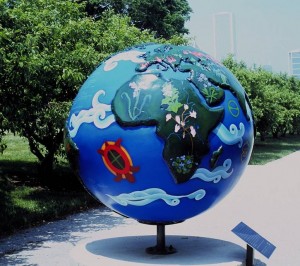Though more and more people don’t think beyond the next seven minutes, most people are familiar with the first part of the Great Law of the Iroquois: “In deliberations, we must consider the impact on the seventh generation.” But the second part of the Great Law is rarely quoted “…even if it requires we have skin as thick as a pine.”
 That latter phrase belies the touchy-feely connotation that “the seventh generation” has come to have in ecological circles. Truly, taking the long view is a much tougher row to hoe. And the entire saying, echoing from the 19th century, is an indictment of the 21st.
That latter phrase belies the touchy-feely connotation that “the seventh generation” has come to have in ecological circles. Truly, taking the long view is a much tougher row to hoe. And the entire saying, echoing from the 19th century, is an indictment of the 21st.
Though a breakthrough in human consciousness is not occurring, and humankind continues to head in the wrong direction with respect to the earth and future generations, some people are seeing that a breakthrough must occur for man to change course.
In the tens of thousands of years of human history and prehistory, since Cro-Magnon times and before, the basic course of man has not changed. No teacher, however illumined, has changed the basic course of man, much less the innumerable conquerors and kings, the rulers of empires and titans of the industrial age.
Science and technology have not altered the basic course of humankind, and the connectivity of the World Wide Web has only laid bare the essential pettiness and destructiveness of man.
So it seems rather absurd to ask whether humankind can change course now, especially when so many, whether they admit it or not, have given up on humanity at the emotional level.
Equally disturbing, most so-called educated people are in deep denial, maintaining that we’re headed in the right direction. Could self-fulfilling cynicism on one hand, and false optimism on the other, paradoxically suggest a basis for some optimism? Perhaps.
Fifteen years ago this question (Can the breakthrough in consciousness that changes the basic course of humankind  occur now?) would have been completely incomprehensible to all but a very few people. After all, wishfully thinking that radical change is occurring in human consciousness indicates an awareness and tacit agreement that it must.
occur now?) would have been completely incomprehensible to all but a very few people. After all, wishfully thinking that radical change is occurring in human consciousness indicates an awareness and tacit agreement that it must.
The background noise of New Age thinking has to be filtered out for the first faint notes of a new kind of music to be heard. The real question is whether people are learning how to listen, so that they can discern for themselves what is true and what is false. And on that score, there may be reason for a smidgen of optimism.
But if humankind is still headed in the wrong direction, despite all the knowledge and technology at our disposal, isn’t that reason for despair, rather than hope?
Have you noticed that when you’re actually faced with a fact, no matter how disturbing or even shattering, hope and despair don’t have anything to do with it? I only have hope when I go away from the fact, and only have despair when I no longer can.
It takes some chutzpah to gainsay Goethe, but as right as he was in many things, he was mistaken and misleading in saying, “One only sees what one looks for, one only looks for what one knows.”
For if one can only see what one looks for, then we are limited by the past, which has humanity by the throat and is suffocating all of us.
Actually, one only sees when conditioning and culture, knowledge and the known—the eroding ground that ‘modern humans’ have stood on since the emergence of our species–effortlessly yields in attention to its entire movement within oneself, and the mind falls effortlessly quiet. Then one sees what is.
 The fact is that humankind is still headed in the wrong direction, and that darkness is growing exponentially in human consciousness. To deny it is to make the mind, even the highly educated mind, a soppy and sappy instrument, given over to wishful thinking.
The fact is that humankind is still headed in the wrong direction, and that darkness is growing exponentially in human consciousness. To deny it is to make the mind, even the highly educated mind, a soppy and sappy instrument, given over to wishful thinking.
When one honestly wants to see things as they are and think from facts rather than what we want to believe, one feels disturbed. And feeling disturbed is a good thing, though most people see it as bad and avoid it like the plague.
In feeling disturbed, insight and growth are possible, even inevitable. That is the real source of optimism–that anyone (including people with very little formal education, as I learned during my visits to Mexico) can think from direct perception with passion and clarity, and thereby affect human consciousness to some degree.
When one considers the course of humankind, which has remained unchanged for thousands of generations, one is humbled and overwhelmed. But persistence pays, and slowly, imperceptibly, the capacity of the mind and heart to meet the challenge grows. So what will it take to actually change the course of humankind?
Clearly, it requires awakening a new mind within one, a mind that is both scientific and religious in the best senses of those words. Such a mind questions, observes and is logical. But it also has the humility of self-knowing, and often feels wonder and awe.
Such a mind is able to use knowledge, but not entrenched in the known; it values expertise, but does not give primacy to experience; it generates ideas, but grows in insight; it resists the temptation to be negative, but awakens states of negation.
As urgently necessary and uniquely possible as a breakthrough in consciousness that changes the basic course of humankind now is, it may not occur in our lifetimes.
Even so, for the generations that have not been conceived, indeed, for generations we cannot even conceive, a few have to awaken a new mind for humanity’s potential to remain intact…for the seventh generation.
Martin LeFevre

